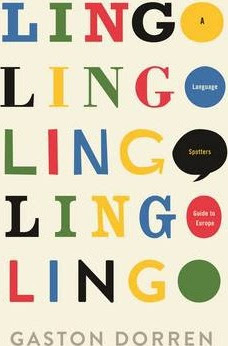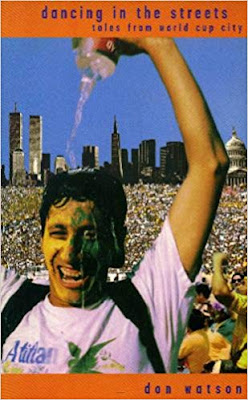Gaston Dorren - Lingo
London: Profile, 2014
Why is this book on the bedroom floor? - I spotted this in a charity shop. It was the spine which caught my attention, proving that you can’t judge a book by its cover but you can certainly get arrested by it.
About the author - Gaston Dorren is a language writer from the Netherlands. He speaks six languages and reads in a number of others. Lingo was based on his book Language Tourism, published in Dutch in 2012 and subsequently published in different languages. He continued the theme of Lingo by writing Babel, about the twenty most spoken languages in the world today. He seems like a very engaging and enthusiastic bloke, at least based on his website at https://languagewriter.com/. The English edition was translated by Alison Edwards, and there were contributions by Jenny Audring and Frauke Watson.
Plot - Around continental Europe in sixty languages, Lingo tells us something interesting beyond the vocab for each and every one.
Review - In my second year at university, one of the mandatory modules in the first half of the year was called sociolinguistics. Basically the study of language in relation to its historical and social context, I found it really interesting. At the same time, I was introduced to Old English - real, Anglo Saxon get an axe in the face English - and merrily spent my evenings early in that semester learning that ‘bone-house’ meant skeleton and “woman” comes from the ancient ‘wif-man’, which coincidentally was probably a nickname for me and many of my fellow undergrads.
However, my journey into one-to-one translation was derailed brutally by a colonial interloper, namely some bloke from Chicago called Ken. He appeared in my sociolinguistics seminar group about two weeks into the course, looking like Philip Seymour Hoffman if he breakfasted in a skip and making no apologies for his nonappearances. He sat in the middle, taking up most of the space in the small office while Doctor Pip Whosesurnameescapesmenow banged on about moats and daubed housing.
At one point, Dr. Pip asked us something about the object in the sentence she wrote on the whiteboard. Everyone aside from Ken looked at the board, then intently to the floor. There was an embarrassed silence, and then she said, “well, it’s in the accusative case if that helps.” There was more silence, and then Ken said, “Don’t you guys know what accusative is?” I have since always kicked myself for not retorting, “I’m not surprised you do, coming from a land of such needless litigation,” but even back then I was aware enough to realise that being a piss-poor PG Wodehouse wasn’t going to get the girls in the group excited.
But no, Ken was correct. The whole group, about half a dozen of us, had no clue what the dative case is, what was the object and what was the subject, or even what a tense was. If pushed, we could probably recall that a noun was a person, place or thing and a verb a doing word, but for most of us state schoolers, English grammar was a foreign language. So the rest of the seminar was given over to Dr. Pip and Ken teaching us the basic building blocks of our own Mother Tongue, and I never did discover if us speaking bastardised French was down to the ratio of mud to cow shit in the walls of my eighth century ancestors.
However, in mitigation, any kind of formal grammar teaching had been absent from my schooling and that of many of my coursemates. Having lost the post-war to the by-then dominant discipline of English Literature teaching, fusty old grammar had become a punchline seen in Monty Python’s Life of Brian, and even though the introduction of the National Curriculum in 1988 saw to it that grammar would be taught with a focus on real-world application, my generation fell between that and Labour’s National Literacy Framework. So basically, I could tell you what the Clown in Othello represents (transition from light to shade; also duplicity), but not if I am the subject or the object of the first clause in that sentence, or even if there’s more than one.
It’s long been a cliche that British people (the English in particular) are incapable of learning a foreign language. The image of the arm-waving, shouting expat is a pernicious one, but in many cases it’s less to do with stubborness and more to do with embarrassment. On every trip to the continent I’ve ever taken, I start off with good intentions which quickly curdle in the red heat of my discomfort. In Berlin a few years ago, a Vietnamese paper shop owner explained in flawless English where the right tea bags were for my morning brew, after I had offered my broken bottle approximation of the request in his second language. So while not absolving the Brits of blame, in my experience it’s more likely a pitying European who will take the reins of an interaction, much like you might complete the sentences of somebody with a severe speech impediment.
Obviously, post 2016 the Brits don’t know whether they’re coming or going as regards the necessity of learning French or Italian. While learning any other tongue is advantageous, the English speaking world’s relationship with Europe is no longer the simple one it used to be. Mandarin educational programmes have started to be heavily funded by the government, suggesting the possibility that future generations will be exchanging struggles with diacritics for ones with Pinyin.
So what better time for a brisk run-through of the foibles of continental lingo? Happily, Gaston Dorren’s Lingo is a short but doughty travel companion and for such a demanding journey, isn’t a passenger talking your ear off or making you want to jump from the train. Taking in both the major western European languages and the tiny, itty-bitty ones, Lingo lives up to its promise to be a true language-spotter’s guide. If it ain’t in here, it’s either a dialect or belongs in Rivendell.
Split into nine loose sections, Lingo offers short summaries of a single language based on an aspect of what makes it distinct. This is perhaps more obvious when comparing Spanish to Swedish but makes huge sense when comparing say, Czech to Slovak, which to the majority of readers probably looks identical. You might expect the first half of the book to be dominated by the big boys - the EU member states or languages with the highest number of native speakers - but we begin in Lithuania (the closest tongue to our ancestral voice, Indo-European) and finish with English. This enables Lingo to blend its own internal voice and it’s entertaining - who would have figured Portuguese and Greek were bedfellows?
As in most pop-culture books concerning a dry subject, it’s the little things you learn in Lingo which hold the most interest. At the end of each section (the longest being about 1200 words, or perhaps six pages), there is a reminder of any loan-words which English might have co-opted from said language, plus one or two interesting words which we may find useful if only we absorbed them. Take the Norwegian utepils, or beer drunk in the open air. The Dutch uitwaaien describes relaxation in a rainy, windy place, while Hungarians can succinctly describe food taken for an outing but returned uneaten: madárlátta. In three words, I can sum up fifteen years worth of summer holidays.
But there is real meat on these short ribs, too. Lingo tells us why German isn’t the dominant language in Europe despite xenophobes pretending it is (it’s argued that because of German expansionism, nationalist feeling in post-conquered territories led to expulsions of historic German populations, causing the numbers to collapse), and why nobody speaks Esperanto, even though it was created to bridge the very gaps in linguistics Lingo is describing (imagine a language made up of the least manageable aspects of several others and that’s why). We’re not talking in-depth sociopolitical study, but something like the pleasant hour spent listening to Dr. Pip - small introductions to heroes, villains, militant nationalists and harmonious peaceniks. It’s like tapas between two sheets of Ryvita.
I could spend this review telling you my favourite little facts about each stop as we traverse the borders (it’s either Sweden’s lock, stock and barrel rejection of its formal ‘would Mr. President like a biscuit?’ grammatical tension or the insane vigesimal counting system of the Bretons) but that would be like typing out a QI book. It’s a fun read, like being offered a tray of chocolates with a cup of tea - your treat doesn’t last long or linger on the palate.
However, it’s this candied variety which is also Lingo’s downfall. Attempting to boil down every language in a landmass is a huge undertaking but not necessarily a completely varied one. While it’s interesting to learn that French clings solidly to Latin’s grammatical skirts, it’s perhaps not so epoch-making to tease your way through the thickets of Maltese tenses. There’s a definite correlation between the interest a section holds and the hold that language has across continental culture. For example, there’s a head-spinning chapter on Welsh which I’ve read three times and have yet to work out, and as for Channel Island Norman...he’s less than a pretty face, anyway.
So I find Lingo falls between two stools: too comprehensive for the casual reader, and nowhere near comprehensive enough for the potential academic. Despite my degree in English (I did earn it, and I didn’t even have to hire Ken for the whole semester!), cases and tenses are still somewhat alien to me and too often the smaller sections rely on them to raise any interest. They certainly weigh the volume down.
The acknowledgments at the rear also confess to the cardinal sin of non-fiction work by referencing Wikipedia, though Dorren immediately points out that it was not his final stop for sources. Using Wiki as a starting point is fine but it immediately deflates a sense of authority. You might ask if it’s likely somebody would mess with a page on, say, Sorbian just for kicks: take a look at the chapter on Serbo-Croat and judge for yourself. Lingo is a holiday read, and so to judge it by academic criteria would be a touch harsh, but again, it finds itself being caught between standard and regional dialects.
For all that, though, I go back to my original position that Lingo is a junior primer on a topic which greatly interests me. It’s not meant to be a key to learning another tongue, merely painting it in primary colours like its vibrant cover, and it largely succeeds. There’s also a delightful irony that Gaston Dorren a Dutchman, had his work on multiple languages translated into English, and quite handy it is too. You might even add some of Lingo’s trivia to your memory banks, but I don’t suppose it would help you buy a sleeper ticket in second class between Budapest and Brno on a bank holiday, when your bicycle’s bost and you’re completely brassic.
Will I move it from the floor to the bookshelf? - Unlikely, unless I manage to get my recalcitrant Black Country vowels around the mystery and lyricism of Cornish.




Comments
Post a Comment